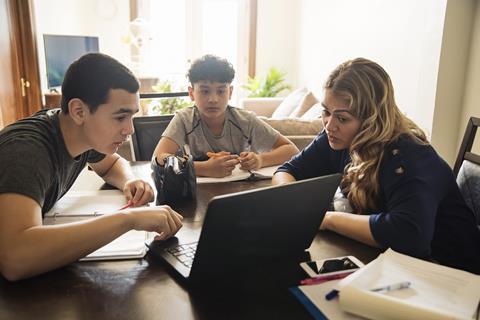Advice on supporting parents to help their children learn at home and look out for their well-being

With another return to remote teaching, many parents have their children learning from home again. A study in Czechia found that some of the biggest issues parents face while their children are home learning are a lack of time, issues with technologies and feeling like they don’t have teaching skills or content knowledge. It can be hard for parents to know how best to support their children in their studies, and they may be coming to you as their child’s teacher asking for advice.
To help you reassure concerned parents, we have compiled answers to some recurring questions such as ‘How can I teach my child science?’, ‘How can I motivate my child to study?’ and ‘How can I look after my child’s mental health and well-being?’. You could even copy and paste the text from the example answers to speed up your email replies. We hope this will help you feel more confident when interacting with parents, as well as save you time.
How can I teach my child science?
Reassure parents that they do not need to teach their children – one of the best ways they can support their child is by learning alongside them and asking questions. For example, they can ask them to explain their work, as well as ask questions such as ‘how did you come to that answer?’ to help with their metacognitive skills. You can also encourage parents to discuss science together with their child when the opportunity arises to help them become more confident in articulating their ideas. Researching real-life scientists and science careers is also a way of increasing pupils’ science capital. Make parents aware of the RSC’s TikTok channel; it’s an easy way to get them started.
Example answer: Many parents are struggling with how best to support their children in their studies, and science may seem like a subject where it is hard to offer support without specialist knowledge. However, no one expects you as a parent to replace your child’s teacher. Ultimately, teachers are there to teach your child the course content and you are not being asked to act as a substitute. As the official government advice says:
‘No one expects parents to act as teachers, or to provide the activities and feedback that a school or nursery would. Parents and carers should do their best to help children and support their learning while dealing with other demands.’
With this in mind, there are some things you can do to assist in your child’s learning. We hope these strategies will boost your confidence in your ability to support your child’s science studies.
1. Be a learner with them
One of the best ways to support your child with their science learning is by being a learner with them. When your child has been set work from school, sit with them for as much time as you can spare – whether that’s three minutes or three hours – and work through the materials with them, doing the learning together.
2. Ask them to explain their work to you
Ask your child to explain to you what they understand from the material, as explaining the content to someone else will help with their learning and consolidate understanding too. (You don’t even have to understand the content, as their teacher will check their understanding later.) Also try asking your child, ‘How did you come to that answer?’ This gets them to think about their learning and how they got there. This is what teachers call metacognitive skills, or the ability to think about your own thinking. It has been proven to help students become better learners over their lifetimes.
3. Discuss science together
The best way you can support your child is by asking questions, encouraging small discussions and paying attention to science. Encourage dialogue, discussion and conversation about their work and scientific topics in general. If something comes up on the TV or the radio, ask your child what they think. Discussing such things with children also allows them to articulate their ideas and use science vocabulary, which are important skills for things like answering exam questions.
4. Research real-life scientists
Discussing science careers and encouraging your child to research them is also highly beneficial for their science education. This increases what educators call science capital – the idea that the more exposure you have to science, the more likely you are to believe that you can ‘do it’ and it is something for you. Not only can it boost your child’s confidence, but it can also show them the relevance of what they’re learning in school to the real world, which can also boost their motivation.
5. Start with the Royal Sosciety of Chemistry’s resources for pupils
A good place to start is encouraging them to check out the Make the difference game on A future in chemistry, the RSC’s science career hub for students, or the RSC’s TikTok channel (@royalsocietyofchemistry), which regularly publishes inspiring – and educational! – chemistry-themed videos.
How can I motivate my child to study?
We published this article during the first lockdown to give teachers more ideas on how to motivate their students. Many of the ideas are relevant to parents too: praise, fostering autonomy and tailoring strategies are some easy-to-implement ideas. If parents report a lack of motivation stemming from low mood, refer them to appropriate support such as YoungMinds.
Example answer: It can be hard for students to feel motivated in the current environment. There are some strategies you can try to help them engage in their studies.
One of the most obvious is positive reinforcement; lots of praise is effective. And make sure to reward and praise things such as your child’s effort or completion of a task rather than their attainment. When you reward their effort, they will be encouraged to put in more, but if you reward achievement, they are more likely to stop trying when a task gets too hard.
Autonomy has also been shown to boost learning. You can get your child to feel more autonomous by planning their own learning, setting their own goals and studying material at their own pace on their own terms. If they’re not motivated to start in the first place, you can try making tasks more engaging by letting them pick which one(s) they want to do from a selection to make them feel more in control.
You know your child best, so tailor your strategies to them: what drives them? For example, if they like a sense of accomplishment, encourage them to start with a series of small, bite-sized tasks for a series of easy wins, breaking down larger tasks if necessary. If they like rewards, use plenty of positive reinforcement or shower them with treats at any opportunity.
Many people, young and old, are struggling at this moment in time, so if you notice that their lack of motivation is stemming from persistent low mood, their mental health may be suffering. If this is the case, you can find more advice and support in places such as the YoungMinds website.
How can I look after my child’s mental health and well-being?
We published an article on this subject for teachers, but many of the points are helpful for parents too: look out for any unusual changes and try and have a conversation with the student about what’s going on for them. If the situation is more severe, refer parents to appropriate support such as YoungMinds. Barnardo’s has also launched a website to help teachers support pupils who may be experiencing mental health and well-being issues.
Example answer: If you notice a change in your child’s behaviour or anything else that is unusual for them – such as a change in appearance, being quieter or chattier than usual, emotional outbursts, or just looking or reporting feeling more tired than usual – this may indicate that they are struggling.
It can be challenging to start a conversation about this, and you may want to plan what you want to say beforehand. Pick an appropriate time when both of you are available and not distracted, and be honest that you have noticed a change in their behaviour and want to check if they are ok. If your child does not want to engage in the conversation, simply remind them that you are there for them when they are ready.
If they articulate what is troubling them, listen to what they say empathetically and in a non-judgemental way and see if there is a possible solution that you can work on together. If the situation is more serious, YoungMinds has a list of organisations to contact in a crisis. Barnardo’s also has more support and advice for parents.
What else can I do to help my child?
A clear and quiet workspace is something that may not be possible for all families, and it is important to acknowledge this. You can also direct parents to places such as the gov.uk and EEF websites, which have resources especially for parents.
Example answer: Try to help your child organise their time and keep to a routine – but don’t worry about trying to maintain the full timetable your child was following at school. A clutter-free, quiet space to work with as few distractions as possible will also help. This may not be 100% possible, but do your best to work with what you’ve got. Visit the gov.uk website and the Education Endownment Foundation website for more advice on how to support your child learning from home.
Don’t forget to post any extra advice you have in the comments below to assist your fellow colleagues. Good luck!














No comments yet